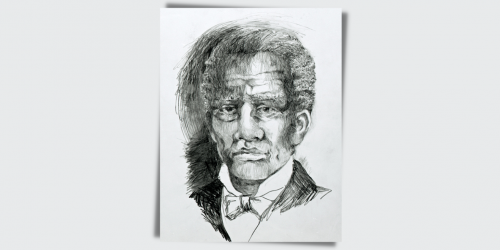
Sketch of William J. Hardy. Source: Grand Rapids History & Special Collections, Archives, Grand Rapids Public Library
William Hardy, the son of Henry and Mary Hardy, was born on January 9, 1823, in New York state. He moved with his parents to Washtenaw County, Michigan, in 1827. His father died when William was about seven years old. When he was about fourteen, his mother bound him out for seven years to a farmer near Ann Arbor. Recognizing the young man’s exceptional abilities, the farmer released William before the seven-year contract ended.
In 1844, William, then about 21 years of age, married Eliza Watts, a member of a free Black family from Pennsylvania. In 1846, William and Eliza purchased a farm in Gaines Township, Kent County, Michigan (near Grand Rapids). The following August, William and Eliza had their first child, a daughter they named Alice. Eventually five more children—four boys (Eugene D., Asher, W. Loyd, and William H.), and one girl (Mary Ellen)—were added to the Hardy family.
In June 1857, Joseph B. Frisbie, a former Methodist minister, held a series of meetings in Caledonia, Michigan. In a letter William Hardy wrote to the Review in 1858, he recalled, “Through the instrumentality of Bro. Frisbie last summer, I was led to see a beauty in what is termed ‘present truth,’ especially the commandments of God.”
Follow-up meetings were held in Caledonia on October 3 and 4, 1857, conducted by Joseph Frisbie, John Byington, and James and Ellen White. On Monday, October 5, Joseph Frisbie baptized eight people. John Byington recorded in his diary that he stayed that night with the Hardy family. Elder Byington noted that Eliza was in the Truth, but that William was not yet decided. Byington described them as a very good and kind mulatto family.
Whether then, or shortly thereafter, William also decided to join the Sabbath-keepers in Caledonia. In his letter in the Review, he went on to say that “after being connected with the Free Baptists a number of years, I was led to cast my lot with the Sabbath-keepers of Caledonia; and I have never regretted that step.”
On Tuesday, January 25, 1859, Ellen White, John Loughborough, and his wife, returning home to Battle Creek after an almost three-week trip, visited the Hardy family. Traveling through fast-falling snow those fourteen miles from Grand Rapids, the three exhausted travelers arrived at the Hardy home in time for the noon meal. After a hearty welcome by the family, a good meal was enjoyed by all. Ellen White recorded in her diary, “Although the house is poor and old, everything is arranged with neatness and exact order. The children are well behaved, intelligent, and interesting. May I yet have a better acquaintance with this dear family.”
Formal organization of the Caledonia Church occurred during meetings conducted November 17 and 18, 1862, by J.N. Loughborough. Its original membership was 34. The following January a Sabbath school was organized. At the same time, two of the Hardy children gave their hearts to the Lord. By mid-1863, the church had grown to 40 members.
In 1868, the Michigan Conference delegates voted permission for the Caledonia Church to change its name to the Gaines Church. Through the years, William was given added leadership responsibilities in this church. By 1876, William was unanimously elected elder of the church. In 1878, it was reported that “The burden of the work here [Gaines Church] now rests almost wholly on Bro. W. J. Hardy.”
In 1870, the fifteenth amendment to the Constitution was passed giving Black men the right to vote. Almost immediately William became involved in local politics. In 1872, he was elected Supervisor from Gaines Township, reportedly the first Black elected to office in the State of Michigan.
After suffering a stroke around 1882, William sold his farm and moved to a much smaller one near the community of Dutton where later he operated a livery stable. Without William’s leadership, by 1885 the Gaines Church disbanded. Following William’s death on June 8, 1888, approximately 400 people attended his funeral—indicating the respect of his White neighbors. A local newspaper eulogized him by saying, “He was a man of honor, honesty and integrity, and was appreciated by the community in which he lived.”
On Oct. 10, 2015, officials in Gaines Township dedicated Hardy Pond, located at the Gaines Township Hall/Prairie Wolf Park site, in honor of its 13th township supervisor, William J. Hardy.
Hardy also is honored at the Hardy Exhibit in Historic Adventist Village in Battle Creek where visitors are told about this stalwart pioneer Adventist.
Larry Onsager, Dean of Libraries, Emeritus, Andrews University, Berrien Springs, Mich. Jim Nix, retired director of the Ellen G. White Estate at the General Conference in Silver Spring, Md.